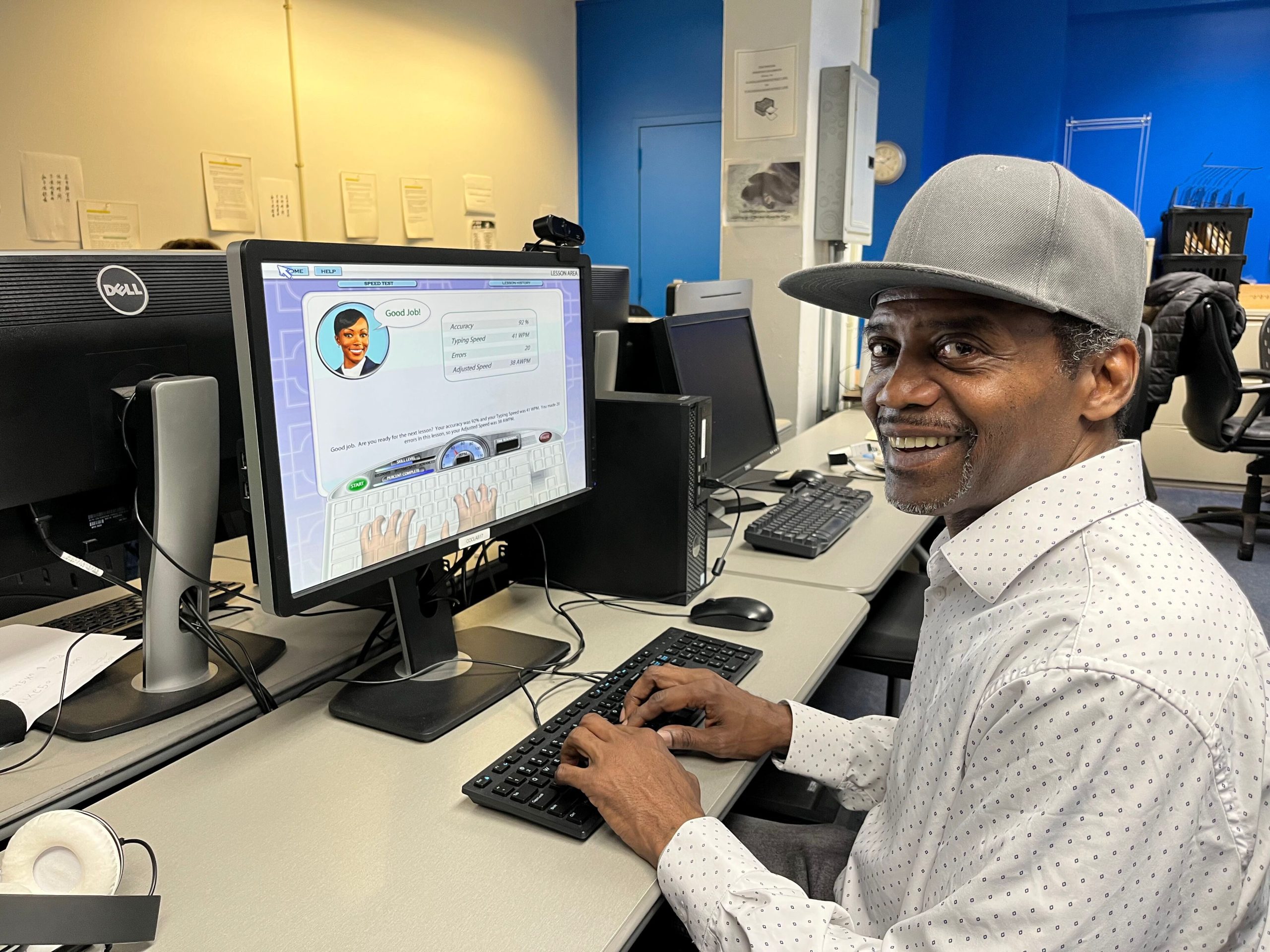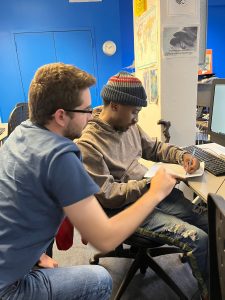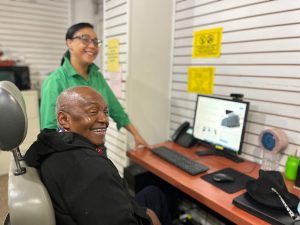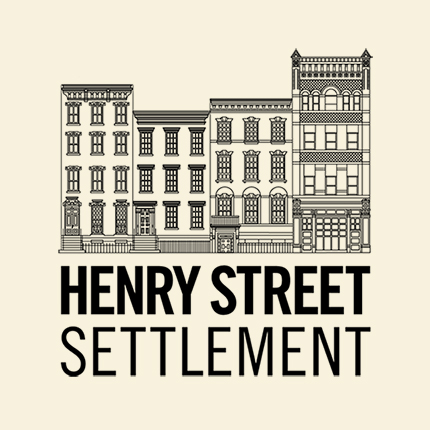Computer Skills Pave Way to Workplace Reentry
By David Montilla

Nelson Holland practiced his typing skills in preparation for an exam at GoodTemps. He passed, and the agency extended his contract for another year.
Eldika Johnson, a former church secretary, had been out of the workforce for several years due to a disability and was dependent on her parents for financial support. But when her father passed away, she realized she needed to find a path to a job. She soon realized that the Microsoft programs she knew were outdated. To upgrade her skills, she signed up for ACCES-VR at Henry Street Settlement in December 2020, at the height of the pandemic. By spring, Eldika was employed–helping organize patients at a Covid vaccination hub. “It was my first time using an iPad,” she says, “and I was able to sign people up for their second shot.” When that job ended, Eldika spent two years at the Department of Education, using her Spanish skills to help newcomers enroll in school.
As the national employment rate for people with disabilities has risen steadily since the pandemic lows of 2020, data from the New York comptroller’s office show that the recovery has been much slower for people with disabilities in the state. On the Lower East Side, within Henry Street’s Community Consultation Center, a two-person team has been helping program participants with debilitating mental challenges overcome obstacles and assimilate into the workforce for over two decades.
Teaming up with organizations like Henry Street, ACCES-VR (Adult Career and Continuing Education Services—Vocational Rehabilitation), serves people who have long grappled with employment challenges. The centerpiece of the program is the Work Readiness portion that provides training in Microsoft applications Word, Excel, Outlook and PowerPoint. It features a strong component of emotional support and career guidance to help participants enter the workforce at a competitive level and is also designed to help them overcome significant emotional barriers to returning successfully to the workplace. With a remarkable 98 percent job-placement rate, the program serves about 60 students a year. Many of them return to class when they need help navigating a technical or personal issue (even popping up in Zoom sessions, which they are welcome to do).
ACCES-VR addresses a specific need in work-readiness for individuals with chronic mental health conditions. Headed by Program Director Piercelia Jackson, the program caters to individuals facing challenges such as substance use, depression, strokes, or other conditions hindering their ability to work. The program’s effectiveness, Jackson says, lies in its intimate scale, which ensures tailored assistance, flexible schedules, and a supportive environment.
“Mental health does not discriminate” – Piercelia Jackson

ACCES-VR participants are welcomed into a collaborative environment.
Participants range from 17 to 72 years old, and some have higher degrees and significant professional experience. Others dream of going back to school. “Mental health does not discriminate,” says Jackson, adding, “We help people get jobs after they’ve been ‘out of commission’” for a long time, she says. “One woman hadn’t worked in 20 years but has now been at the Department of Education for 10. That’s something she was not able to achieve on her own.”
Since classes went online early in the pandemic, students have been able to join on Zoom any time during the day, although they can now meet in person as well. “It was instrumental for people getting through this difficult time,” Jackson says. “People were losing family members, suffering from anxiety and depression. It was a good way to maintain community.”
“It really feels remarkable to get back into the workforce after you’ve been out. You can’t even describe it. It’s like you’re a new person and you have a new life.” – Mary Ward
Henry Street Settlement’s ACCES-VR program benefits from long-term relationships with employment agencies like GoodTemps, run by Goodwill Industries, and Workforce One, which places quite a few graduates. Mary Ward had been out of work due to a back injury when she decided to take a refresher course. While in the class, she got a call from a temporary agency to work in Mayor Adams’s office. “Bingo, I’m out of here!” she said, laughing.
Today, working for Small Business Services, Mary says, “It really feels remarkable to get back into the workforce after you’ve been out. You can’t even describe it. It’s like you’re a new person and you have a new life.”
Another recent graduate, Nelson Holland, had done data entry in the past as an office assistant. He came to ACCES-VR to update his software skills. “The transition to the workforce just made me happy,” says Nelson who is now working at the Department of Sanitation as an administrative assistant. “It’s just a joy for me now that I’m sober and clean; I’m focused 100%. It’s a good feeling. With upgraded software, I’m more confident in myself. Now, I’m doing stuff on the job that I learned here.”

Piercelia Jackson and ACCES-VR participant Vincent Johnson browse the web for assistive technology.
For Jackson, who teaches work-readiness skills and oversees job placement, a key part of taking in new participants is discerning the problems they have had at work in the past, so they can help their students deal with those issues if they come up again. Together with computer instructor Khadija Bouallou, she says, “We’re training people to really survive at work: collaboration, interpersonal skills, and relating to supervisors.”
These stories fill Jackson with pride. One participant had immigrated to the United States from Nairobi, Kenya. While living in one of Henry Street’s shelters, she accessed counseling services from the CONNECT mental health program, which in turn introduced her to ACCES-VR. Both programs are housed at Henry Street’s Community Consultation Center on the Lower East Side. Though she does not yet have her work permit, she now has the skills to get a job as soon as it arrives. “When she graduates, she should have a job she should be able to survive on, without benefits,” Jackson says. “That is our goal, to get [our students] as financially independent as possible. We are small, but effective.”
